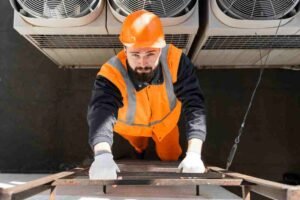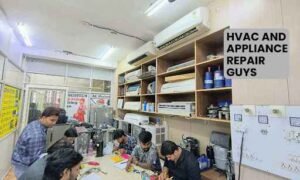Have you ever wondered how much energy your HVAC system actually uses? Heating and cooling your home can take up a significant portion of your energy bill. By improving HVAC efficiency, you can reduce these costs and enjoy a more comfortable home. In this article, we’ll show you easy steps to help make your HVAC system run more efficiently, saving you money and keeping your home just the right temperature.
Understanding HVAC Efficiency
HVAC efficiency shows how well your heating, ventilation, and air conditioning system uses energy. When your HVAC system is inefficient, it can lead to high energy bills and uneven temperatures in your home. To boost your HVAC efficiency, focus on regular maintenance, smart upgrades, and small changes in your usage.
The Importance of Regular Maintenance
One of the best ways to ensure your HVAC system runs well is to schedule regular maintenance. Seasonal check-ups help catch problems early and keep everything running smoothly.
Change or clean filters every 1-3 months. Inspect ductwork for leaks and keep outdoor units clear of debris. These steps can make a big difference. Also, schedule a professional inspection at least once a year. This ensures everything is working properly. This proactive approach prevents costly repairs later and extends your system’s life.
Upgrade to Smart Thermostats
Another effective way to boost HVAC efficiency is by upgrading to a smart thermostat. These devices help you better control the temperature in your home by allowing you to set schedules and even control your system remotely with a smartphone.
Smart thermostats can learn your habits and adjust the temperature automatically to fit your lifestyle. They also provide energy usage reports to help you make better decisions about how and when to heat or cool your home. With this level of control, you can avoid unnecessary energy use and enjoy consistent comfort.
Insulation and Sealing for Better Efficiency
Your HVAC system isn’t the only thing that affects comfort and energy use. Good insulation and sealing are important too. Without proper insulation, heat escapes in winter and enters in summer. This makes your HVAC system work harder. So, to boost efficiency, ensure your home has good insulation, especially in attics and walls.
Sealing gaps around windows and doors with weather stripping helps stop heat loss or gain. Also, using thermal curtains or shades adds extra insulation. This keeps your home at a steady temperature without straining your HVAC system.
Upgrade Your Equipment for Long-Term Savings
If your HVAC system is older than 10-15 years, it might be time for an upgrade. Newer models are designed to be more energy-efficient, saving you money on your utility bills. When choosing a new system, look for models with an Energy Star rating, as these meet strict energy efficiency guidelines. Replacing outdated equipment may require a bigger upfront investment, but the energy savings over time will make it worthwhile. For even more personalized help, consider working with professional HVAC services to get expert advice and tailored solutions for your home.
Maximize Your Comfort and Savings
Improving your HVAC efficiency doesn’t just lead to lower energy bills-it also helps maintain a comfortable living environment year-round. By keeping your system well-maintained, using smart technology, and improving your home’s insulation, you can optimize your HVAC performance.
For more on this content, visit the rest of our blog!







